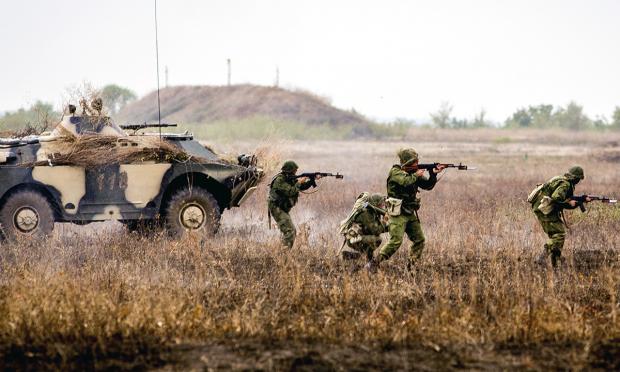The Russian governor of Kherson has threatened to strike a bridge linking Moldova and Romania, following the Ukrainian missile attack on the bridge linking parts of the region with the Crimean peninsula. Moldova's Foreign Ministry issued a statement on Twitter on the issue, strongly condemning the threats made by the Russian official.
"Moldova strongly condemns the recent statements by a representative of the Russian Federation in Kherson, Ukrainian territory under Russian occupation, in which our country was directly threatened. Such statements are totally unacceptable. We will not tolerate such expressions directed against the Republic of Moldova," the statement of the press office of the ministry reads.
Moldova, a former Soviet republic of 2.6 million people bordering Ukraine and Romania, has faced large numbers of refugees, rising inflation, power cuts and instability in the breakaway region of Transnistria, controlled by Russian separatists, since the start of the Russian invasion of Ukraine.
<blockquote class="twitter-tweet"><p lang="en" dir="ltr">⛔️ UNACCEPTABLE ⛔️<br><br>The Republic of Moldova vehemently condemns threats directed at Moldova made by a Russian representative in the ocupied part of Ukraine.<br><br>Direct threats against our country are utterly unacceptable. <a href="https://twitter.com/embrus_md?ref_src=twsrc%5Etfw">@embrus_md</a> will offer explanations today at <a href="https://twitter.com/MoldovaMFA?ref_src=twsrc%5Etfw">@MoldovaMFA</a>.</p>— ?? MFA Moldova (@MoldovaMFA) <a href="https://twitter.com/MoldovaMFA/status/1671824118017142785?ref_src=twsrc%5Etfw">June 22, 2023</a></blockquote> <script async src="https://platform.twitter.com/widgets.js" charset="utf-8"></script>
As reported by Radio Free Europe, the Moldovan Foreign Ministry in Chisinau urgently summoned the Russian ambassador in Chisinau, Oleg Vassnetsov, for an explanation, after a Moscow representative in Ukraine suggested that the Russian army could hit the Dzhurgiulesti bridge.
The Russian-appointed governor of Kherson, Vladimir Shaldo, suggested that the Russian military might strike the Dzhurgulesti bridge in response to the Ukrainian attack on a bridge linking the Kherson region to Crimea. "We know the coordinates of the bridges in the Odessa region and Dzhurgulesti in Moldova, which were part of Ukraine but were surrendered by the Yushchenko regime. A very serious answer will come very soon," said Saldo, filming himself on the bombed bridge.
The Foreign Ministry from Bucharest later announced that "Romania strongly condemns the statements of the so-called 'representative' of Russia in Hersonissia, a territory illegally occupied by Russia." "Such statements directed at the Republic of Moldova and which also target part of the territory of Romania, a NATO ally, are unacceptable. At the same time, hitting civilian infrastructure is a war crime," the Romanian Foreign Ministry stresses.
Ukrainian missiles hit the Chiongar road bridge connecting Crimea with Russian-controlled parts of the southern Kherson region overnight, so-called local officials said on Thursday, according to Reuters. There was no immediate comment from Kiev, which has declared its intention to retake Crimea and expel all Russian forces from its territory.
Moldova as collateral damage of the Russia-Ukraine war
Moldova expressed concern in April after Russian soldiers stationed in the breakaway region of Transnistria, participating in the peacekeeping mission in the buffer zone between Moldova and the region, carried out military manoeuvres without seeking Kishinev's consent.
Moldova's delegation to the Unified Control Commission, CUC, - which manages the security zone and consists of representatives of Moldova, Russia and the separatist regime from Tiraspol - said the manoeuvres violated the security zone's status. Moldova called on Russia to refrain from any action that could exacerbate tensions in the region and to respect agreements on the peace operation.
"The delegation of Moldova notes that during 2023 the military detachment of the Russian Federation within the framework of the Joint Peacekeeping Forces unilaterally and repeatedly violated the regime of the Security Zone," it said, "in particular by using armoured vehicles, which leads to tension in the situation under the responsibility of the Joint Peacekeeping Forces."
Between February and April, Russian armoured military equipment moved out of the range of the Joint Peacekeeping Force. The manoeuvre was not coordinated with the Unified Control Commission. Moldovan authorities reported that a convoy consisting of a "BTR-60" armoured car and a military truck carrying soldiers, with their faces hidden under masks, moved to the internal customs and police checkpoint in the village of Pirita and returned to Outpost No. 9 on 19 April.
The unannounced movement of military equipment, including armoured vehicles, caused confusion among Moldovan police and customs post personnel. As the barrel of the armoured vehicle was pointed towards this police checkpoint, the actions of the Russian military detachment were perceived as a possible attack. The zonadesecuritate.md portal reported that the Russian detachment explained its uncoordinated move, saying it was a check of equipment.
However, retired US General David Petraeus, who commanded US forces in Iraq and Afghanistan and was CIA director from 2011-2012, warned that Moldova was a vulnerable target. "A vulnerable and unstable Moldova could be the Kremlin's next target. Or it could also be just another distraction," he said in an interview with Radio Free Europe.
The Unified Control Commission was established in 1992, after the "Dniester War", in which Russia supported the forces of the separatist Tiraspol regime against the forces of the newly independent Moldova. Subsequently, Moscow concluded a peace agreement with Moldova on 21 July 1992 and subsequently became a guarantor of peace in the region.
The peacekeeping mission consists of Moldovan, Russian and Transnistrian soldiers and numbers about 1,500 men. These Russian soldiers have been instructed to be on Moldovan territory.
But Russia also maintains about 1,500 soldiers in Transnistria, divided into "peacekeepers" and the Russian troops' Operational Group of Russian troops, OGRT, who guard the ammunition depot in Kobasna, and who are illegally in Moldova without a mandate.



